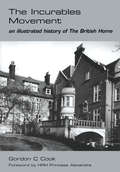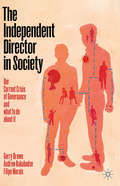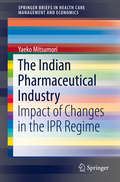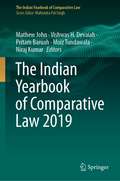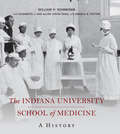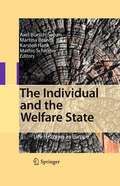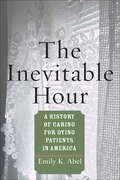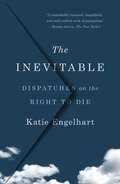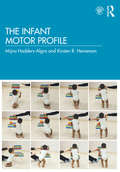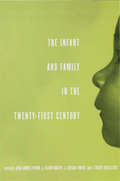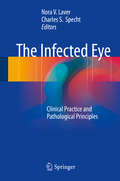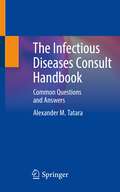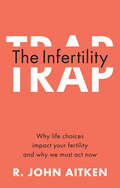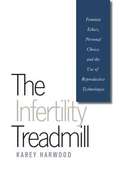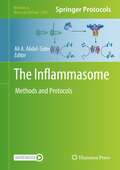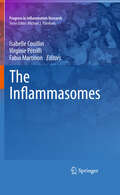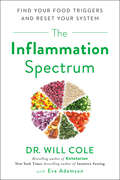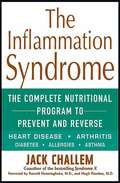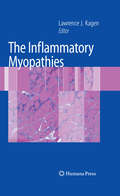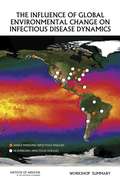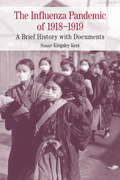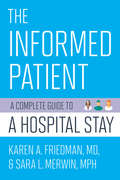- Table View
- List View
The Incurables Movement: v. 4, Respiratory Disease, Mental Health, Diabetes, Dermatology
by Gordon C. CookThis significant work records the history of the pioneering British Home and Hospital for Incurables, founded in 1861. It examines the social, political and medical climate through the years and charts the fascinating and important changes over this time. It provides a vital overview for historians of medicine, healthcare and social development. Physicians, nurses and managers involved in care of the elderly and long-term sick will find the research enlightening, as will local historians and anyone with an interest in the history of South London.
The Independent Director in Society: Our current crisis of governance and what to do about it
by Andrew Kakabadse Gerry Brown Filipe MoraisThings will always go wrong in organisations. The question is how quickly will they get caught and put right? The problem facing every organisation today – our businesses, universities, health services, or the many other sporting and charitable institutions that shape our society – is that the relationship between their executive management and those whose job it is to oversee them (whether they are called non-executive or independent directors, trustees, or governors) has become unbalanced. The Independent Director in Society shows how to rebalance it. Based on original, in-depth research from Henley Business School, this is the first book to survey and analyse the governance crisis right across society rather than just focus upon the business sector. The authors show that – despite their many differences – all organisations have many issues, behaviours and problems in common. The same problems require, in many cases, the same solutions. Sometimes they don’t. The authors offer two answers. The first lies in the realm of policy. Not a need for more legislation, but a move to give the existing codes of practice back their teeth and make them fit for purpose. The second lies with independent directors themselves. Urgent improvement is needed in standards of thought and action as well as the calibre of these directors. Above all, directors need to develop an independent mindset that will enable them to make better, more accurate decisions. There are many elements to creating this culture, including selection, training and education for directors, and support from chairs and executive teams, but most of all directors themselves must recognise their responsibilities in a complex and volatile world.
The Indian Pharmaceutical Industry: Impact of Changes in the IPR Regime (SpringerBriefs in Health Care Management and Economics)
by Yaeko MitsumoriThis study analyzes the impact of the revision of the Indian Patent Act (2005) on the Indian pharmaceutical industry, which has been achieving healthy growth over the past 30 to 40 years or more. As of 2005, the Indian pharmaceutical industry was ranked as No. 4 in the world in terms of volume and 15th in terms of value. WTO/TRIPS required India to revise its patent law, however, and to introduce product patents in the pharmaceutical field. Many not only in India but also in the world had argued that the local pharmaceutical industry could deteriorate once a strong patent law (such as a product patent) was introduced. However, the Indian pharmaceutical industry has continued to develop rapidly even after the revision of the patent law in 2005. This present study started with efforts to work out the reason the Indian pharmaceutical industry successfully expanded even after the introduction of product patents. The study found that a unique article (the so-called '3-d‘) inserted in the Patent Act 2005 might have played a role in diminishing or preventing a negative impact from the introduction of a strong patent system, such as a product patents. The study also considers that a change of the business model adopted by the Indian pharmaceutical industry might have contributed to diminishing the effect of the negative impact from the introduction of a strong patent law. This study also covers recent developments in India regarding intellectual property rights and the pharmaceutical industry. One is India’s very first compulsory license granted to an Indian pharmaceutical company, Natco, against the large German pharmaceutical firm Bayer; and the second is the Supreme Court decision on Novartis’ Gleevec. The study analyzes the fundamental problems that caused these two events: access to medicine and gaps in the concept of intellectual property in the pharmaceutical industry. As possible solutions to these fundamental issues, this book explores the ideas of voluntary licensing and tiered pricing.
The Indian Yearbook of Comparative Law 2019 (The Indian Yearbook of Comparative Law)
by Niraj Kumar Vishwas H. Devaiah Mathew John Pritam Baruah Moiz TundawalaThis book is a compilation of thematically arranged essays that critically analyze emerging developments, issues, and perspectives in the field of comparative law, especially in the field of comparative constitutional law. The book discusses limits and challenges of comparativism, comparative aspects of arbitral awards, cross-border consumer disputes, online hate speech, authoritarian constitutions, issues related to legal transplants, the indispensability of the idea of the concept of Rechtsstaat, interdisciplinary challenges of comparative environmental law, free exercise of religions, public interest litigation, constitutional interpretation and developments, and sustainable development in model BITs. It comprises seven parts, wherein the first part focuses on general themes of comparative law, the second part discusses private law through a comparative lens, and the third, fourth, and fifth parts examine aspects of public law with special focus on constitutional law, human rights, environmental law, and economic laws. The last part of the book covers recent developments in the field of comparative law. The book intends to seamlessly tie together discussions on both public and private law aspects of comparative law. It encourages readers to gain a nuanced understanding of the working of law, legal systems, and legal cultures while aiding deliberations on the constituents of an ideal system of law.
The Indiana University School of Medicine: A History (Well House Books)
by William H. SchneiderThe Indiana University School of Medicine: A History tells the story of the school and its faculty and students in fascinating detail. Founded in the early 20th century, the Indiana University School of Medicine went on to become a leading medical facility, preparing students for careers in medicine and providing healthcare across Indiana. Historian William Schneider draws on a treasure trove of historical images and documents, to recount how the school began life as the Medical Department in 1903, and later became the Indiana University School of Medicine, which was established as a full four-year school after merging with two private schools in 1908. Thanks to state support and local philanthropy, it quickly added new hospitals, which by the 1920s made it the core of a medical center for the city of Indianapolis and the only medical school in the state.From modest beginnings, and the challenges of the Great Depression and the Second World War, the medical school has grown to meet the demands of every generation, becoming the leading resource for not only the education of physicians and for the conducting of medical research but also for the care and treatment of patients at the multi-hospital medical center. Today, the school boasts an annual income of over $1.5 billion, with over 2,000 full-time faculty teaching 1,350 MD students, and over $250 million in external research funding.
The Individual Service Funds Handbook: Implementing Personal Budgets in Provider Organisations
by Robin Miller Helen SandersonThe Individual Service Funds Handbook is the definitive guide to one of the most innovative forms of personal budget in health and social care. It gives a clear explanation of what Individual Service Funds (ISFs) are, how to use them effectively and includes all the information you need in order to implement them in your organisation. The Handbook spans a range of settings, including a dementia care home, supported living and residential homes for adults with learning disabilities and people who use mental health services. It also sets out guidelines and templates which can be used when implementing ISFs, addressing key practical concerns including: how to put together effective support plans, and how to ensure that ISFs are delivered in a person-centred way, how to overcome organisational complexities in implementation and supporting managers. A one-stop resource for anyone wanting to understand the potential of ISFs, the Handbook is required reading for service providers, commissioners, and those engaged in person-centred practice and personalisation, including user-led organisations.
The Individual and the Welfare State
by Mathis Schröder Martina Brandt Karsten Hank Axel Börsch-SupanOur health, our income and our social networks at older ages are the consequence of what has happened to us over the course of our lives. The situation at age 50+ reflects our own decisions as well as many environmental factors, especially interventions by the welfare state. This book explores the richness of 28,000 life histories in thirteen European countries, collected as part of the Survey of Health, Ageing and Retirement in Europe (SHARE). Combining these data with a comprehensive account of European welfare state interventions provides a unique opportunity to answer the important public policy questions of our time - how the welfare state affects people's incomes, housing, families, retirement, volunteering and health. The overarching theme of the welfare state creates a book of genuinely interdisciplinary analyses, a valuable resource for economists, gerontologists, historians, political scientists, public health analysts, and sociologists alike.
The Inevitable Hour: A History of Caring for Dying Patients in America
by Emily K. AbelChanges in health care have dramatically altered the experience of dying in America.At the turn of the twentieth century, medicine’s imperative to cure disease increasingly took priority over the demand to relieve pain and suffering at the end of life. Filled with heartbreaking stories, The Inevitable Hour demonstrates that professional attention and resources gradually were diverted from dying patients. Emily K. Abel challenges three myths about health care and dying in America. First, that medicine has always sought authority over death and dying; second, that medicine superseded the role of families and spirituality at the end of life; and finally, that only with the advent of the high-tech hospital did an institutional death become dehumanized. Abel shows that hospitals resisted accepting dying patients and often worked hard to move them elsewhere. Poor, terminally ill patients, for example, were shipped from Bellevue Hospital in open boats across the East River to Blackwell’s Island, where they died in hovels, mostly without medical care. Some terminal patients were not forced to leave, yet long before the advent of feeding tubes and respirators, dying in a hospital was a profoundly dehumanizing experience.With technological advances, passage of the Social Security Act, and enactment of Medicare and Medicaid, almshouses slowly disappeared and conditions for dying patients improved—though, as Abel argues, the prejudices and approaches of the past are still with us. The problems that plagued nineteenth-century almshouses can be found in many nursing homes today, where residents often receive substandard treatment. A frank portrayal of the medical care of dying people past and present, The Inevitable Hour helps to explain why a movement to restore dignity to the dying arose in the early 1970s and why its goals have been so difficult to achieve.
The Inevitable: Dispatches on the Right to Die
by Katie EngelhartA riveting, incisive, and wide-ranging book about the Right to Die movement, and the doctors, patients, and activists at the heart of this increasingly urgent issue. More states and countries are passing right-to-die laws that allow the sick and suffering to end their lives at pre-planned moments, with the help of physicians. But even where these laws exist, they leave many people behind. The Inevitable moves beyond margins of the law to the people who are meticulously planning their final hours—far from medical offices, legislative chambers, hospital ethics committees, and polite conversation. It also shines a light on the people who help them: loved ones and, sometimes, clandestine groups on the Internet that together form the “euthanasia underground.”Katie Engelhart, a veteran journalist, focuses on six people representing different aspects of the right to die debate. Two are doctors: a California physician who runs a boutique assisted death clinic and has written more lethal prescriptions than anyone else in the U.S.; an Australian named Philip Nitschke who lost his medical license for teaching people how to end their lives painlessly and peacefully at “DIY Death” workshops. The other four chapters belong to people who said they wanted to die because they were suffering unbearably—of old age, chronic illness, dementia, and mental anguish—and saw suicide as their only option. Spanning North America, Europe, and Australia, The Inevitable offers a deeply reported and fearless look at a morally tangled subject. It introduces readers to ordinary people who are fighting to find dignity and authenticity in the final hours of their lives.
The Infant Motor Profile
by Mijna Hadders-Algra Kirsten R HeinemanThe Infant Motor Profile is a practical manual on a new, evidence-based method to assess infant motor behaviour. Not only looking at what milestones the infant has reached, but also paying attention to the quality of motor behaviour – how the infant moves – this text provides professionals involved in the care of infants at risk of developmental disorders with information on five domains of motor behaviour: variation, adaptability, symmetry, fluency, and performance. Backed up by extensive, up-to-date research, it includes percentile curves so that professionals can easily interpret the infants’ scores. The profile created from the assessment informs about the infant’s current condition and their risk of developmental disorders, as well as providing suggestions for early intervention, tailored to the strengths and limitations of the infant. Used over time, it can be an excellent instrument to monitor the infant’s developmental progress. Illustrated with numerous figures and accompanied by a website hosting over 100 video clips, this text is an essential read for professionals in developmental paediatrics, including paediatric physiotherapists, occupational therapists, developmental paediatricians, neuropaediatricians, and paediatric physiatrists.
The Infant and Family in the Twenty-First Century (The Mentor Series (IACAPAP))
by T. Berry Brazelton J. Kevin Nugent João Gomes-Pedro J. Gerald YoungFirst Published in 2003. Routledge is an imprint of Taylor & Francis, an informa company.
The Infected Eye
by Nora V. Laver Charles S. SpechtThis book discusses the diagnosis and treatment of common ocular infections with the aim of clearly explaining current recommended clinical practice in order to aid physicians involved in the care of patients. Relevant pathological principles are described to provide a basis for the understanding of these disorders. The epidemiology of infection as a class of ocular disease and the pathological effects of infectious processes in tissue are discussed in an introductory section. These fundamentals are explained and reinforced with tables and selected illustrations of tissue pathology. Leading clinical specialists then describe the diagnosis and treatment of infections of the conjunctiva, cornea, intraocular tissues, orbit, eyelids, and ocular adnexa as they present in adults and children. Illustrative tables and algorithms enhance the discussion, making key principles accessible to the busy clinician. The book contains useful appendices that summarize relevant microbiological techniques, recommendations for specimen collection and transport, and current principles for the appropriate use of antibiotics.
The Infectious Diseases Consult Handbook: Common Questions and Answers
by Alexander M. TataraThis book is an evidence-based guide for some of the most common consult questions asked of a first-year infectious diseases (ID) fellow working in an academic teaching hospital. Divided into sections based on pathogen and organ system, each covered topic includes reviews of the latest published literature in succinct subsections that can be easily referenced. The book can be read cover to cover as an introduction to clinical infectious diseases through the eyes of an ID fellow or used as a reference in real-time when on clinical service. Written throughout the fellowship of an ID fellow, this handbook shares the quintessential ID topics most commonly encountered on the consult service. From global pandemics to the emergence of drug-resistant superbugs, interest in infectious diseases has never been higher. ID experts weigh in daily on a variety of cases ranging from simple urinary tract infections to devastating sepsis in patients with recent organ transplantation. The ID consult service can be overwhelming given the breadth of infectious diseases that affect our patients. This handbook offers an introductory yet comprehensive resource to professionals, practitioners, students, and fellows.
The Infertility Trap: Why life choices impact your fertility and why we must act now
by R. John AitkenA potential crisis in human fertility is brewing. As societies become more affluent, they experience changes that have a dramatic impact on reproduction. As average family sizes fall, the selection pressure for high-fertility genes decreases; exacerbated by the IVF industry which allows infertility-linked genes to pass into the next generation. Male fertility rates are low, for many reasons including genetics and exposure to environmental toxins. So, a perfect storm of factors is contriving to drive fertility rates down at unprecedented rates. If we do not recognize the reality of our situation and react accordingly, an uncontrollable decline in population numbers is likely, which we'll be unable to reverse. This book will address, in a unique and multi-faceted way, how the consequences of modern life affects fertility, so that we can consider behavioural, social, medical and environmental changes which could reduce the severity of what is about to come.
The Infertility Treadmill: Feminist Ethics, Personal Choice, and the Use of Reproductive Technologies
by Karey HarwoodCombining attention to lived experience with the critical tools of ethics, Karey Harwood explores why many women who use high-tech assisted reproduction methods tend to use them repeatedly, even when the results are unsuccessful. With a compassionate look at the individual decision making behind the desire to become pregnant and the use of assisted reproductive technologies (ART), Harwood extends the public conversation beyond debates about individual choice by considering the experiences of families and by addressing the broader ethical problems presented by these technologies.
The Inflammasome: Methods and Protocols
by Christine De Nardo Eicke LatzThis Methods in Molecular Biology book offers methods for studying inflammasome function, including generation of inflammasome stimuli, monitoring of caspase-1 activity and processing, activation of IL-1β cytokines, plus lab protocols, material lists and tips.
The Inflammasome: Methods and Protocols (Methods in Molecular Biology #2459)
by Ali A. Abdul-SaterThis volume provides inflammasome instructions and tips to study different aspects of inflammasome biology. Chapters guide readers through how to assess canonical and non-canonical inflammasome activation, in vitro immune and non-immune cells, whole blood, biochemical assays to evaluate ASC oligomerization, gasdermin D cleavage, and mapping phosphorylated residues of NLRP3. Written in the format of the highly successful Methods in Molecular Biology series, each chapter includes an introduction to the topic, lists necessary materials and reagents, includes tips on troubleshooting and known pitfalls, and step-by-step, readily reproducible protocols. Authoritative and cutting-edge, The Inflammasome: Methods and Protocols aims to provide protocols that will serve as tools for current and aspiring researchers interested in studying inflammasomes.
The Inflammasomes
by Fabio Martinon Virginie Pétrilli Isabelle CouillinThe inflammasome was first described in 2002 as a molecular complex activating proinflammatory caspases and therefore regulating the maturation and biological activities of cytokines such as IL-1 and IL-18. This finding was substantiated by the identification of several mutations in the cias1 gene, encoding the human NLRP3 protein, responsible for several autoinflammatory disorders such as the Muckle Wells syndrome. Since, the interest for this complex has constantly increased and several inflammasome complexes with different specificities have been described. These inflammasomes sense a wide variety of pathogens and danger signals and are key players in the inflammatory response. With the contributions of leading international experts in the field, this book provides an extensive overview of the current knowledge of inflammasome biology and their role in health and disease.
The Inflammation Spectrum: Find Your Food Triggers and Reset Your System
by Eve Adamson Will ColeFrom the international bestselling author of Ketotarian comes a revolutionary new plan to discover the foods your unique body loves, hates, and needs to feel great.In Dr. Will Cole's game-changing new book, readers will discover how inflammation is at the core of most common health woes. What's more, it exists on a continuum: from mild symptoms such as weight gain and fatigue on one end, to hormone imbalance and autoimmune conditions on the other. How you feel is being influenced by every meal. Every food you eat is either feeding inflammation or fighting it. Because no one else is you, the foods that work well for someone else may not be right for your body. At heart, The Inflammation Spectrum is about learning to love your body enough to nourish it with delicious, healing foods. You'll find insightful quizzes and empowering advice to put you on a path toward food freedom and overall healing, once and for all.
The Inflammation Syndrome: The Complete Nutritional Program To Prevent And Reverse Heart Disease, Arthritis, Diabetes,Allergies, And Asthma
by Jack ChallemWhat is the Inflammation Syndrome? It's the cumulative effect of low-grade inflammation -including the aches and pains that we all experience-that grows into chronic, debilitating disease. The Inflammation Syndrome breaks down your body, making you feel old, tired, and sick. Triggered by inflammatory foods in your diet, the Inflammation Syndrome wreaks havoc on your health, paving the way for such serious diseases as heart disease, diabetes, Syndrome X, obesity, arthritis, allergies, asthma-even some cancers. Written by the best-selling coauthor of the groundbreaking Syndrome X, the book that helped bring the attention of the public to insulin resistance and the diabetes epidemic, The Inflammation Syndrome is the first major book to describe the broad role inflammation plays in disease-and to show you how to reverse and heal it. Drawing on the cutting-edge research being done all over the world-research that has led to the successful treatment of many people who were considered unbeatable or incurable by conventional medicine-Jack Challem provides a revolutionary approach to healing inflammation through an easy-to-follow nutritional program. Challem includes quizzes and tests to assess inflammation levels and risks; anti-Inflammation Syndrome recipes and menu plans; and easy ways to use healthy fats and other nutrients to quench the fires of inflammation. Challem reveals many of the hidden dangers in foods that set the stage for inflammation, causing aches, pains, and allergic reactions and increasing the long-term risk of life- threatening diseases. He shares the latest information on the problems with conventional prescription and over-the- counter anti-inflammatory drugs. He also offers dramatic case histories of patients treated by nutritionally oriented practitioners and up-to-the-minute information on and dosage recommendations for the best natural anti-inflammation supplements, such as fish oils, vitamin E, herbs, and many other natural remedies. Providing a powerful plan to safely prevent and overcome inflammatory disorders, The Inflammation Syndrome shows just how easy it can be to take charge of one's diet and health-and to feel great.
The Inflammatory Myopathies
by Lawrence J. KagenThis book presents a comprehensive review of the inflammatory myopathies, including dermatomyositis, polymyositis, and inclusion body myositis. Representing the most up-to-date knowledge on this family of diseases, The Inflammatory Myopathies covers clinical presentation, methods of diagnosis, ongoing assessment of clinical course, treatment, and the latest information on pathogenesis. Physical, laboratory, imaging, and serological findings are discussed in the context of chronic disease, complications, and co-morbidities. The role and mechanism of inflammatory response is also explored with reference to emerging humoral and cellular targets for therapeutic intervention. The Inflammatory Myopathies is the gold-standard in the field and a must have resource for rheumatologists, neurologists and all healthcare professionals who treat afflicted patients.
The Influence of Chemistry on New Foods and Traditional Products
by Arpan Bhagat Giorgia Caruso Salvatore Parisi Giampiero Barbieri Caterina Barone Zachary Ryan ConleyThis Brief concerns the influence of chemistry in the modern food and beverages industry. The world of traditional foods has been soundlessly but increasingly interconnected with the chemical industry in the last century. Different areas are considered in a multidisciplinary approach: - the production of chemical additives and of non-food components needed in the food industry (e. g. packaging materials) - the regulatory perspective of the whole food production chain - commercialization of food commodities - the problem of food safety from the viewpoint of official auditors with medical or veterinarian competencies - new and emerging risks related to food packaging materials - the assessment of the authenticity of edible products. This Brief includes different viewpoints, ranging from the management of allergens and food additives in the food plant to the complex matter of the formulation of traditional products with the consequent production of "alternative" versions of the same food.
The Influence of Global Environmental Change on Infectious Disease Dynamics: Workshop Summary
by Eileen R. ChoffnesThe twentieth century witnessed an era of unprecedented, large-scale, anthropogenic changes to the natural environment. Understanding how environmental factors directly and indirectly affect the emergence and spread of infectious disease has assumed global importance for life on this planet. While the causal links between environmental change and disease emergence are complex, progress in understanding these links, as well as how their impacts may vary across space and time, will require transdisciplinary, transnational, collaborative research. This research may draw upon the expertise, tools, and approaches from a variety of disciplines. Such research may inform improvements in global readiness and capacity for surveillance, detection, and response to emerging microbial threats to plant, animal, and human health. "The Influence of Global Environmental Change on Infectious Disease Dynamics" is the summary of a workshop hosted by the Institute of Medicine Forum on Microbial Threats in September 2013 to explore the scientific and policy implications of the impacts of global environmental change on infectious disease emergence, establishment, and spread. This report examines the observed and potential influence of environmental factors, acting both individually and in synergy, on infectious disease dynamics. The report considers a range of approaches to improve global readiness and capacity for surveillance, detection, and response to emerging microbial threats to plant, animal, and human health in the face of ongoing global environmental change.
The Influenza Pandemic of 1918–1919: A Brief History With Documents
by Susan K. KentThe influenza pandemic of 1918-19 appeared suddenly at the end of the First World War and with explosive impact took the lives of at least 30 million people worldwide. Spreading rapidly across the globe, it defied all previous understandings of the disease, striking the youngest and healthiest individuals most acutely and confounding the doctors and governments who struggled to contain it. In this volume, Susan Kingsley Kent presents an overview of the disease, detailing its symptoms, tracking its spread, and offering insights into the medical community's understanding of and reaction to the pandemic. <P><P> Documents from period newspapers, medical journals, and government publications, as well as letters, journal entries, memoirs, and novels written by survivors and medical staff, provide a variety of perspectives from six continents and illuminate the impact of the pandemic — from the lives of children orphaned by the flu to colonial rebellions for which the pandemic served as a major catalyst. Document headnotes, maps and illustrations, a chronology, questions for consideration, a selected bibliography, and an index enrich students' understanding.
The Informed Patient: A Complete Guide to a Hospital Stay (The Culture and Politics of Health Care Work)
by Karen A. Friedman Sara L. MerwinEven the most capable individuals are challenged when confronted with the complexity of the modern hospital experience. The Informed Patient is a guide and a workbook, divided into topical, focused sections with step-by-step instructions, insights, and tips to illustrate what patients and their families can expect during a hospital stay. Anyone who will experience a hospital stay—or friends or family who may be in charge of a patient’s care—will find all the help and advice they could need in the detailed sections that cover every aspect of what they can expect.Karen A. Friedman, MD, and Sara L. Merwin, MPH, offer hands-on advice about how patients, health care providers, and medical staff can work together to achieve good outcomes. Through anecdotes, tips, sidebars, and clinical scenario vignettes, The Informed Patient presents ways to enhance and optimize a hospital stay, from practical advice on obtaining the best care to dealing with the emotional experience of being in the hospital.
